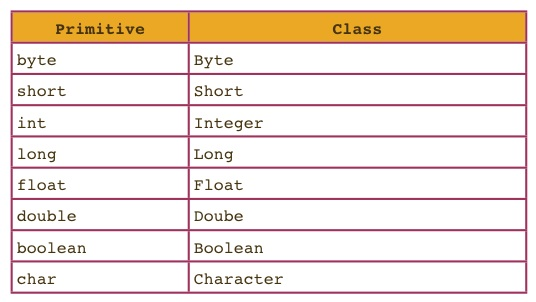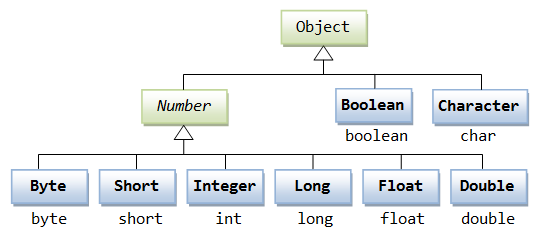Advanced Syntax
Automatic Conversions
Using generics:
- Generic classes require us to provide one or more actual type arguments
- Before Java 8:
ArrayList<String> L = new ArrayList<String>() - After Java 8:
ArrayList<String> L = new ArrayList<>()
- Before Java 8:
- Generics need reference type as actual type arguments
Reference Types
Java has 8 primitive types, all other types are reference types. For each primitive type, there is a corresponding reference type called a wrapper class. 

Conversion between int and Integer is annoying:
ArrayList<String> L = new ArrayList<String>()
L.add(new Integer(5));
int first = L.get(0).valueOf();Autoboxing and Unboxing
Autoboxing (auto-unboxing): Implicit conversions between wrapper/primitives.
L.add(5)
int first = L.get(0);Wrapper types and primitives can be used almost interchangeably.
- If Java code expects a wrapper type and gets a primitive, it is autoboxed.
public static void blah(Integer x) {
System.out.println(x);
}
int x = 20;
blah(x);- If the code expects a primitive and gets a wrapper, it is unboxed.
public static void blahPrimitive(int x) {
System.out.println(x);
}
Integer x = new Integer(20);
blahPrimitive(x);Note:
- Arrays are never autoboxed/unboxed
- e.g. an
Integer[]cannot be used in place of anint[](or vice versa).
- e.g. an
- Autoboxing / unboxing incurs a measurable performance impact!
- Wrapper types use MUCH more memory than primitive types.
Warpper Type Class
public final class Integer extends Number implements Comparable<Integer> {
private final int value;
public Integer(int value) {
this.value = value;
}
...
}Widening
Widening: A primitive type with narrower range is implicitly converted to a wider range type.
int x = 20;
double y = x; // Widen int to doubleWider -> narrower: type casting
double x = 20;
int y = (int) x;Immutability
An immutable data type is a data type whose instances cannot change in any observable way after instantiation.
- e.g.
Stringobjects are immutable- Concatenating strings returns a new
Stringobject
- Concatenating strings returns a new
- Any data type with non-private variables is mutable
- Unless those variables are declared
final
The final keyword will help the compiler ensure immutability.
- final variable means you will assign a value once (either in constructor of class or in initializer).
- Not necessary to have final to be immutable (e.g. Dog with private variables).
- Declaring a reference as
finaldoes not make object immutable.public final ArrayDeque<String> d = new ArrayDeque<String>();
Generics
Generic Methods
With generics defined in class headers, Java waits for the user to instantiate an object of the class in order to know what actual types each generic will be.
- Static methods don't have related object
- Fix: generic methods
To declare a method as generic, the formal type parameters must be specified before the return type:
public static <K,V> V get(Map61B<K,V> map, K key)Calling:
ArrayMap<Integer, String> isMap = new ArrayMap<Integer, String>();
System.out.println(mapHelper.get(isMap, 5));- Autometically infer types
Type Upper Bounds
https://docs.oracle.com/javase%2Ftutorial%2F/java/generics/restrictions.htmlextends in another viewpoint A extends B:
- Context of inheritance: Giving A the ability of B
- Context of generics: A must be B
extendsimposes a constraint
public class A<B extends SomeInterface<B>> implements SomeInterface<A> {
...
}B extends SomeInterface<B>meansBmust belong to SomeInterfaceextends Comparable<B>B must be comparable